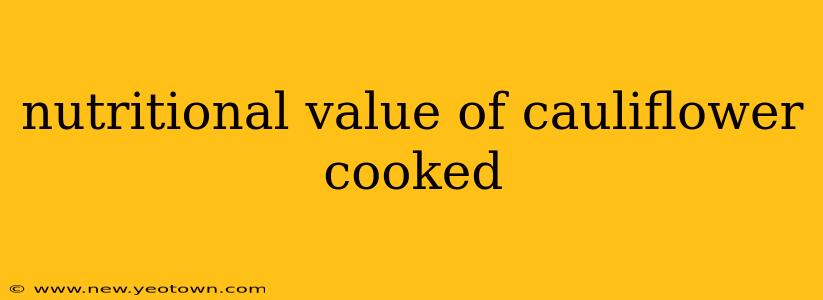Cauliflower, that often-overlooked member of the cruciferous vegetable family, is a culinary chameleon, easily adapting to countless recipes. But beyond its versatility lies a nutritional powerhouse waiting to be discovered. While raw cauliflower boasts impressive health benefits, cooking it can actually enhance the bioavailability of certain nutrients and make it even more delicious and accessible. Let's delve into the nutritional riches of cooked cauliflower.
What are the nutritional benefits of cooked cauliflower?
Cooking cauliflower, whether steamed, roasted, or boiled, doesn't significantly diminish its nutritional value. In fact, some nutrients become more readily absorbed by the body after cooking. The gentle heat breaks down cell walls, making it easier for your body to access essential vitamins and minerals.
How does cooking affect the nutritional content of cauliflower?
One common concern is nutrient loss during cooking. While some water-soluble vitamins like vitamin C might be slightly reduced with prolonged boiling, steaming or roasting minimizes this loss. The key is to cook cauliflower until tender-crisp, avoiding overcooking, which leads to mushy texture and nutrient depletion.
Does boiling cauliflower reduce its nutritional value?
Boiling cauliflower does lead to some loss of water-soluble vitamins, but the overall nutritional impact is relatively small. The benefits of consuming cooked cauliflower still significantly outweigh any minimal nutrient loss. To minimize loss, consider steaming or using the cooking water (rich in nutrients!) in soups or sauces.
How are the nutrients in cauliflower affected by different cooking methods?
Different cooking methods affect cauliflower's nutritional profile in subtle ways. Roasting, for instance, can enhance the natural sweetness and create a delightful caramelization, without significant nutrient loss. Steaming preserves most nutrients, resulting in a tender yet slightly firm texture. Microwaving is a quick option, but can sometimes lead to slightly less appealing texture. Ultimately, the cooking method is a matter of personal preference, with minimal impact on the overall nutritional value.
What are the vitamins and minerals in cooked cauliflower?
Cooked cauliflower remains an excellent source of:
- Vitamin C: A powerful antioxidant crucial for immune function.
- Vitamin K: Essential for blood clotting and bone health.
- Folate: Important for cell growth and development, especially crucial during pregnancy.
- Potassium: Supports healthy blood pressure.
- Fiber: Promotes digestive health and helps regulate blood sugar levels.
- Choline: Supports brain health and liver function.
How many calories are in cooked cauliflower?
One cup of cooked cauliflower contains approximately 25-30 calories, making it a low-calorie, high-nutrient food perfect for weight management. Its high fiber content also promotes feelings of fullness, helping you stay satisfied between meals.
Is cooked cauliflower good for weight loss?
Absolutely! Its low calorie count, high fiber content, and abundance of vitamins and minerals make it an ideal addition to a weight-loss diet. It's filling and helps to curb cravings, keeping you on track with your health goals.
Can I eat cooked cauliflower every day?
While there are no restrictions on eating cooked cauliflower daily, moderation in all things is key. A varied diet containing a range of fruits and vegetables is always the healthiest approach.
In conclusion, cooked cauliflower remains a remarkably nutritious vegetable, offering a wide array of vitamins, minerals, and fiber, all while being low in calories. Experiment with different cooking methods to find your favorite way to enjoy this versatile and incredibly healthy food. Its place in a balanced diet is well-deserved.

